USB chargers (power adapters), power banks
Table of contents
-
Measurement equipment for testing
-
AC power adapters with USB PD3.2 support:
-
[Google Pixel Flex Dual Port 67W (2C)] • Reset-free • P̶D̶1̶2̶V̶ • S̶2̶2̶-̶2̶4̶(̶P̶l̶u̶s̶/U̶l̶t̶r̶a̶)̶ 4̶5̶W̶ • Pixel 9/10 Pro XL 37W • R̶a̶s̶p̶b̶e̶r̶r̶y̶ P̶i̶5̶ • AVS SPR (IPhone 17)
-
-
AC power adapters with USB PD3.1 support:
-
[Anker GaN Prime 240W (3C1A)] • Reset-free • P̶D̶1̶2̶V̶ • S22-24(Plus/Ultra) 45W • S̶2̶5̶(̶P̶l̶u̶s̶/U̶l̶t̶r̶a̶)̶ 4̶5̶W̶ • P̶i̶x̶e̶l̶ 9̶/1̶0̶ P̶r̶o̶ X̶L̶ 3̶7̶W̶ • R̶a̶s̶p̶b̶e̶r̶r̶y̶ P̶i̶5̶ • AVS EPR
-
[SlimQ 150W (3C1A)] • Reset-free • PD12V • S22-24(Plus/Ultra) 45W • S25(Plus/Ultra) 45W • P̶i̶x̶e̶l̶ 9̶/1̶0̶ P̶r̶o̶ X̶L̶ 3̶7̶W̶ • R̶a̶s̶p̶b̶e̶r̶r̶y̶ P̶i̶5̶ • A̶V̶S̶
-
[AOHi Magcube 140W (2C1A)] • Reset-free • PD12V • S22-24(Plus/Ultra) 45W • S25(Plus/Ultra) 45W • Pixel 9/10 Pro XL 37W • R̶a̶s̶p̶b̶e̶r̶r̶y̶ P̶i̶5̶ • A̶V̶S̶
-
-
AC power adapters with USB PD3.0 support:
-
[INIU 100W (2C1A)] • Reset-free • PD12V • S22-24(Plus/Ultra) 45W • S̶2̶5̶(̶P̶l̶u̶s̶/U̶l̶t̶r̶a̶)̶ 4̶5̶W̶ • P̶i̶x̶e̶l̶ 9̶/1̶0̶ P̶r̶o̶ X̶L̶ 3̶7̶W̶ • R̶a̶s̶p̶b̶e̶r̶r̶y̶ P̶i̶5̶ • A̶V̶S̶
-
[CUKTECH 100W 2C1A] • Reset-free • PD12V • S22-24(Plus/Ultra) 45W • S25(Plus/Ultra) 45W • P̶i̶x̶e̶l̶ 9̶/1̶0̶ P̶r̶o̶ X̶L̶ 3̶7̶W̶ • R̶a̶s̶p̶b̶e̶r̶r̶y̶ P̶i̶5̶ • A̶V̶S̶
-
[INIU 65W (2C1A)] • Reset-free • PD12V • S22-24(Plus/Ultra) 45W • S̶2̶5̶(̶P̶l̶u̶s̶/U̶l̶t̶r̶a̶)̶ 4̶5̶W̶ • P̶i̶x̶e̶l̶ 9̶/1̶0̶ P̶r̶o̶ X̶L̶ 3̶7̶W̶ • R̶a̶s̶p̶b̶e̶r̶r̶y̶ P̶i̶5̶ • A̶V̶S̶
-
[Amazon Basics USB 65W (1C)] • R̶e̶s̶e̶t̶-̶f̶r̶e̶e̶ • PD12V • S̶2̶2̶-̶2̶4̶(̶P̶l̶u̶s̶/U̶l̶t̶r̶a̶)̶ 4̶5̶W̶ • S̶2̶5̶(̶P̶l̶u̶s̶/U̶l̶t̶r̶a̶)̶ 4̶5̶W̶ • P̶i̶x̶e̶l̶ 9̶/1̶0̶ P̶r̶o̶ X̶L̶ 3̶7̶W̶ • R̶a̶s̶p̶b̶e̶r̶r̶y̶ P̶i̶5̶ • A̶V̶S̶
-
[CUKTECH GaN 65W (2C1A)] • R̶e̶s̶e̶t̶-̶f̶r̶e̶e̶ • PD12V • S22-24(Plus/Ultra) 45W • S25(Plus/Ultra) 45W • P̶i̶x̶e̶l̶ 9̶/1̶0̶ P̶r̶o̶ X̶L̶ 3̶7̶W̶ • R̶a̶s̶p̶b̶e̶r̶r̶y̶ P̶i̶5̶ • A̶V̶S̶
-
[Baseus Picogo 67W (2C1A)] • R̶e̶s̶e̶t̶-̶f̶r̶e̶e̶ • PD12V • S22-24(Plus/Ultra) 45W • S̶2̶5̶(̶P̶l̶u̶s̶/U̶l̶t̶r̶a̶)̶ 4̶5̶W̶ • P̶i̶x̶e̶l̶ 9̶/1̶0̶ P̶r̶o̶ X̶L̶ 3̶7̶W̶ • R̶a̶s̶p̶b̶e̶r̶r̶y̶ P̶i̶5̶ • A̶V̶S̶
-
[Xiaomi Hypercharge 120W (PD65W) (1A)] • R̶e̶s̶e̶t̶-̶f̶r̶e̶e̶ • PD12V • S̶2̶2̶-̶2̶4̶(̶P̶l̶u̶s̶/U̶l̶t̶r̶a̶)̶ 4̶5̶W̶ • S̶2̶5̶(̶P̶l̶u̶s̶/U̶l̶t̶r̶a̶)̶ 4̶5̶W̶ • P̶i̶x̶e̶l̶ 9̶/1̶0̶ P̶r̶o̶ X̶L̶ 3̶7̶W̶ • R̶a̶s̶p̶b̶e̶r̶r̶y̶ P̶i̶5̶ • A̶V̶S̶
-
-
DC-DC power adapters with USB PD3.1 support:
-
[Buck-boost module on LM5175+IP2736 140W (1C)] • R̶e̶s̶e̶t̶-̶f̶r̶e̶e̶ • PD12V • S22-24(Plus/Ultra) 45W • S25(Plus/Ultra) 45W • Pixel 9/10 Pro XL 37W • R̶a̶s̶p̶b̶e̶r̶r̶y̶ P̶i̶5̶ • A̶V̶S̶
-
-
DC-DC power adapters with USB PD3.0 support:
-
[SlimQ M0002C Charging Hub (2C2A)] • Reset-free • PD12V • S̶2̶2̶-̶2̶4̶(̶P̶l̶u̶s̶/U̶l̶t̶r̶a̶)̶ 4̶5̶W̶ • S25(Plus/Ultra) 45W • Pixel 9/10 Pro XL 37W • R̶a̶s̶p̶b̶e̶r̶r̶y̶ P̶i̶5̶ • A̶V̶S̶
-
[XY-PDS100 (1C1A)] • R̶e̶s̶e̶t̶-̶f̶r̶e̶e̶ • PD12V • S22-24(Plus/Ultra) 45W • S25(Plus/Ultra) 45W • Pixel 9/10 Pro XL 37W • Raspberry Pi5 • A̶V̶S̶
-
[Anker Car Charger 167.5W (2C1A)] • Reset-free • P̶D̶1̶2̶V̶ • S22-24(Plus/Ultra) 45W • S̶2̶5̶(̶P̶l̶u̶s̶/U̶l̶t̶r̶a̶)̶ 4̶5̶W̶ • P̶i̶x̶e̶l̶ 9̶/1̶0̶ P̶r̶o̶ X̶L̶ 3̶7̶W̶ • R̶a̶s̶p̶b̶e̶r̶r̶y̶ P̶i̶5̶ • A̶V̶S̶
-
[USB3.1 QC to PD converter (1C)] • R̶e̶s̶e̶t̶-̶f̶r̶e̶e̶ • P̶D̶1̶2̶V̶ • S̶2̶2̶-̶2̶4̶(̶P̶l̶u̶s̶/U̶l̶t̶r̶a̶)̶ 4̶5̶W̶ • S̶2̶5̶(̶P̶l̶u̶s̶/U̶l̶t̶r̶a̶)̶ 4̶5̶W̶ • P̶i̶x̶e̶l̶ 9̶/1̶0̶ P̶r̶o̶ X̶L̶ 3̶7̶W̶ • R̶a̶s̶p̶b̶e̶r̶r̶y̶ P̶i̶5̶ • A̶V̶S̶
-
[PD 65W module (1C)] • R̶e̶s̶e̶t̶-̶f̶r̶e̶e̶ • PD12V • S̶2̶2̶-̶2̶4̶(̶P̶l̶u̶s̶/U̶l̶t̶r̶a̶)̶ 4̶5̶W̶ • S25(Plus/Ultra) 45W • Pixel 9/10 Pro XL 37W • R̶a̶s̶p̶b̶e̶r̶r̶y̶ P̶i̶5̶ • A̶V̶S̶
-
[SW3518 buck modules (1C1A)] • R̶e̶s̶e̶t̶-̶f̶r̶e̶e̶ • PD12V • S̶2̶2̶-̶2̶4̶(̶P̶l̶u̶s̶/U̶l̶t̶r̶a̶)̶ 4̶5̶W̶ • S25(Plus/Ultra) 45W • Pixel 9/10 Pro XL 37W • R̶a̶s̶p̶b̶e̶r̶r̶y̶ P̶i̶5̶ • A̶V̶S̶
-
[SW2303 PL5501 module (1C)] • R̶e̶s̶e̶t̶-̶f̶r̶e̶e̶ • PD12V • S22-24(Plus/Ultra) 45W • S25(Plus/Ultra) 45W • Pixel 9/10 Pro XL 37W • R̶a̶s̶p̶b̶e̶r̶r̶y̶ P̶i̶5̶ • A̶V̶S̶
-
[SW3538 140W Black module (1C1A)] • R̶e̶s̶e̶t̶-̶f̶r̶e̶e̶ • PD12V • S22-24(Plus/Ultra) 45W • S25(Plus/Ultra) 45W • Pixel 9/10 Pro XL 37W • R̶a̶s̶p̶b̶e̶r̶r̶y̶ P̶i̶5̶ • A̶V̶S̶
-
[SW3538 140W Blue module (1C1A)] • R̶e̶s̶e̶t̶-̶f̶r̶e̶e̶ • PD12V • S22-24(Plus/Ultra) 45W • S25(Plus/Ultra) 45W • Pixel 9/10 Pro XL 37W • R̶a̶s̶p̶b̶e̶r̶r̶y̶ P̶i̶5̶ • A̶V̶S̶
-
-
DC-DC USB-A power adapters without PD protocol support
-
Wireless DC power adapters:
-
External batteries (Power banks):
-
[Samsung Powerbank 10000 mAh 25W (2C)] • R̶e̶s̶e̶t̶-̶f̶r̶e̶e̶ • P̶D̶1̶2̶V̶ • S̶2̶2̶-̶2̶4̶(̶P̶l̶u̶s̶/U̶l̶t̶r̶a̶)̶ 4̶5̶W̶ • S̶2̶5̶(̶P̶l̶u̶s̶/U̶l̶t̶r̶a̶)̶ 4̶5̶W̶ • P̶i̶x̶e̶l̶ 9̶/1̶0̶ P̶r̶o̶ X̶L̶ 3̶7̶W̶ • R̶a̶s̶p̶b̶e̶r̶r̶y̶ P̶i̶5̶ • A̶V̶S̶
-
-
Other USB power adapters
Measurement equipment for testing
Measurement tool:
-
USB-tester has been used for fast charging protocol detection - Power-Z KM003C(Amazon), (AliExpress).
-
KM003C firmware version: 1.9.8
USB cables have been used in testing:
-
UsbC-UsbC USB4 PD3.1 EPR 240W
-
UsbC-UsbC SuperVOOC compatible
-
UsbC-UsbC CUKTECH 6A PD3.1 EPR 240W (120W Xiaomi)
-
UsbA-UsbC VOOC/SuperVOOC 2.0 compatible
-
UsbA-UsbC Xiaomi Hypercharge 6A 120W original
-
UsbA-UsbC Vivo SuperFlash 6A 120W compatible
Google Pixel Flex Dual Port 67W (2C) (Amazon.de) (Amazon.com)
Key product benefits:
-
The charger supports the latest PD3.2 AVS SPR protocol with a power of 67W in standard mode (non-peak).
-
The PD3.2 AVS SPR protocol is necessary, in particular, for the maximum charging power of the iPhone 17 at 40W.
-
PPS 21V support is important for some smartphones, such as the Google Pixel 9 Pro XL or Google Pixel 10 Pro XL (37W and 45W respectively), and can only be achieved if the charger supports the PPS 21V protocol.
-
Very good power consumption in standby mode - class VI.
-
Delta Electronics Inc. - the OEM manufacturer of the adapter, has established itself as a reliable equipment manufacturer.
-
Power distribution between ports:
-
One port C1 or C2: 67W
-
Two ports: 67W distributed dynamically between ports (for example, the following pairs were recorded during testing: 52W(PD)+14W(PPS), 24W(PPS)+21W(PPS))
-
The PPS protocol is always available even when both ports are used simultaneously, which is rare, and as a rule, the PPS protocol is disabled in this mode of operation for chargers with a power rating of <67W.
-
Both ports are equivalent in terms of power distribution. A more powerful consumer draws more power from whichever port it is connected to (the laptop drew 52W when both ports, USB-C1 and USB-C2, were used simultaneously).
-
When the second consumer was disconnected, all unused power was returned to the first port's budget (the laptop had access to all 67W without interruption).
-
Weight: 151g
-
Dimensions (mm): 66x28.5x56.5 (94.3 with European plug)
Product drawbacks:
-
The reset-free feature is not fully implemented. If the charger is fully loaded, connecting a second device may (but not always) interrupt the power supply to the first device. However, if both devices together do not exceed the power capacity of the charger, there will be no interruption in power supply.
-
No PD12V support
-
No PPS 5A support for the 5-11V range, which does not allow you to get the full 45W for Samsung S22-S24 Plus/Ultra smartphones, only 21-25W.
Supported charging protocols claimed by manufacturer:
-
5V3A, 9V3A, 15V4A, 20V3.35A (67W Max),
-
PPS 5V-11V3A, 5-16V4A, 5-21V3.35A(67W),
-
AVS 9V-15V4A, 15-20V3.35A(67W)
Supported charging protocols detected by KM003C:
-
USB-C1/C2 ports:
-
PD3.2 AVS SPR 67W DPS 67W: 9-20V4A, 3.35A
-
PD3.0 67W: 5V3A,9V3A,15V4A,20V3.35A
-
PD3.0 QC5 PPS: 5-16V4A, 5-21V3.35A
-
DCP
-





Key product benefits:
-
Impressive 240W of total supplied power can easily charge powerful laptops, smartphones, and other USB devices simultaneously at full speed!
-
UsbC1 port supports modern AVS EPR protocol
-
PPS 3.3-11V5A support, together with a cable rated for 5A (100W/240W), will provide the fastest possible Super Fast Charge 2.0 45W charging for Samsung S22, S23, and S24 smartphones (Plus and Ultra versions).
-
Power IQ 4.0 technology for seamless redistributing excessive power budget among ports without power interruption between connected devices during plug-in/out.
-
Relatively compact and heavy (which means a more powerful heatsink inside) which is beneficial for desk chargers.
-
Very good idle power consumption (around 0.15W) - energy efficiency class VI.
-
Power factor correction (PFC).
-
Premium materials and excellent design
-
Impressive thick AC cord and reliable connection with charger.
-
Energy conversion efficiency around 90% (even at 25% of load)
-
Power distribution between ports:
-
One port: UsbC1 - 140W, UsbC2,UsbC3 -100W, UsbA-22.5W
-
Two ports: UsbC1+UsbC2/3=140W+100W, UsbC1+UsbA=140W+22.5W, UsbC2+UsbC3=65W+35W
-
Three/Four ports: UsbC1 - always 140W, UsbC2+UsbC3+UsbC4=100W shared
-
-
Weight: 539g(only brick), 663g (with AC cable)
-
Dimensions (mm): 32x102x72
Product drawbacks:
-
The top UsbC1 port might be picky to some EPR cables. I have one (out of 6) cable which is an e-maker chip PD3.1 EPR which was not recognized by this port.
-
No PD12V support.
Other product notes:
-
You can watch a YouTube video review and test this power adapter here.
Supported charging protocols claimed by manufacturer:
-
USB-C1: 5V3A, 9V3A, 15V3A, 20V5A, 28V5A (140W Max)
-
USB-C2/C3: 5V3A, 9V3A, 15V3A, 20V5A (100W Max)
-
USB-A: 5V3A, 5V4.5A, 9V2A, 12V1.5A, 4.5V5A, 10V2.25A (22.5W Max)
Supported charging protocols detected by KM003C:
-
USB-C1(140W) port:
-
PD3.1 140W EPR, AVS, PPS, QC5 (Fixed 5V,9V,15V-3A,20V-5A, PPS: 3.3-11V-5A, EPR 28V-5A, AVS 15-28V 140W)
-
QC2.0/3.0 (5V, 9V, 12V, 3.6-12V)
-
DCP
-
-
USB-C2/C3(100W) ports:
-
PD3.0 100W, PPS, QC4+ (Fixed 5V,9V,15V-3A,20V-5A, PPS: 3.3-11V-5A)
-
FCP 24W (5.2V2A, 9V2A,12V2A)
-
SCP 22W (5V-12V, 0.03A-4A)
-
AFC 24W (5V2A,9V2A,12V2A)
-
QC2.0/3.0 (5V, 9V, 12V, 3.6-12V)
-
DCP
-
APPLE 2.4A
-
-
USB-A port:
-
FCP 24W (5.2V2A, 9V2A,12V2A)
-
SCP 22W (3.3V-12V, 0.03A-4A)
-
AFC 24W (5V2A,9V2A,12V2A)
-
QC2.0/3.0 (5V, 9V, 12V, 3.6-12V)
-
MTK PE+1.1/2.0 - not detected
-
DCP
-
APPLE 2.4A
-



Key product benefits:
-
The USB-C1/C2 ports support PD3.1 with up to 140W power each
-
The USB-C3 port supports PD3.0 that supports up to 100W
-
The USB-A port supports QC fast charging.
-
Amazing travel accessories already in the package:
-
UsbC-UsbC low-resistance (80mOhm) cable 240W, 480Mbps
-
4 international plug adapters: UK, AU, EU, KR + adapter has US plug
-
1.8m Extension AC Cord, you do not need to plug the adapter directly into the socket.
-
-
Numerous safety features like overheating, over-voltage, over-current, short-circuiting, flameless materials, etc.
-
PD12V support. It's useful in case you want to replace the conventional AC-DC 12V adapter using the UsbC-DC cable.
-
PPS 3.3-20V5A support, together with a cable rated for 5A (100W/240W), will provide the fastest possible Super Fast Charge 2.0 45W charging for Samsung S22, S23, S24 and S25 smartphones (Plus and Ultra versions).
-
In case of simultaneous USB ports use it can provide Reset-free power distribution by the next scenarios:
-
140W
-
or 100W+45W
-
or 65W+45W+45W
-
or 65W+45W+22W+18W.
-
-
Weight: 246g
-
Dimensions (mm): 30x77x76 (121 with EU AC plug)
Product drawbacks:
-
No AVS EPR protocol support.
Supported charging protocols claimed by manufacturer:
-
USB-C1/C2:
-
PD2.0-3.0, PD3.1, PPS, QC2.0-4.0+, Apple 2.4A, Samsung 2.0A, FCP, SCP, AFC, PE1.0-2.0, BC1.2
-
Max140W, 10V2A, 5V3A, 9V3A, 12V3A, 15V3A, 20V5A, 28V5A
-
-
USB-C3:
-
PD2.0-3.0, PPS, QC2.0-4.0+, FCP, SCP, AFC, PE.
-
Max100W, 10V2A, 5V3A, 9V3A, 12V3A, 15V3A, 20V5A
-
-
USB-A:
-
QC2.0-3.0, Samsung 2.0A, Apple 2.4A, FCP, SCP, AFC, BC1.2.
-
Max18W, 5V3A, 9V2A, 12V1.5A
-
Supported charging protocols detected by KM003C:
-
USB-C(1-2) ports:
-
PD3.1 140W EPR, PPS, QC5 (Fixed 5V,9V,12V,15V-3A,20V-5A, PPS: 3.3-20V-5A, EPR 28V-5A, AVS - not detected)
-
FCP 18W (5.2V2A, 9V2A,12V1.5A)
-
SCP 22W (3.3V-10V, 0.03A-2.2A)
-
AFC 24W (5V2A,9V2A,12V2A)
-
QC2.0/3.0 (5V, 9V, 12V, 3.6-12V)
-
MTK PE+1.1/2.0
-
DCP 5V1.5A
-
APPLE 2.4A
-
-
USB-C(3) port:
-
PD3.0 100W, PPS, QC5 (Fixed 5V,9V,12V,15V-3A,20V-5A, PPS: 3.3-20V-5A)
-
FCP 18W (5.2V2A, 9V2A,12V1.5A)
-
SCP 18W (3.3V-10V, 0.03A-1.8A)
-
AFC 24W (5V2A,9V2A,12V2A)
-
QC2.0/3.0 (5V, 9V, 12V, 3.6-12V)
-
MTK PE+1.1/2.0
-
DCP 5V1.5A
-
APPLE 2.4A
-
-
USB-A port:
-
FCP 18W (5.2V2A, 9V2A,12V1.5A)
-
SCP 18W (3.3V-10V, 0.03A-1.8A)
-
AFC 24W (5V2A,9V2A,12V2A)
-
QC2.0/3.0 (5V, 9V, 12V, 3.6-12V)
-
MTK PE+1.1/2.0
-
BC1.2(DCP 5V1.5A)
-
APPLE 2.4A
-





Key product benefits:
-
USB-C1/C2 ports support PD3.1 with up to 140W each.
-
USB-A port supports fast charging up to 22.5W.
-
PD12V support. It's useful in case you want to replace the conventional AC-DC 12V adapter using the UsbC-DC cable.
-
PPS 21V support is important for some smartphones, such as the Google Pixel 9 Pro XL or Google Pixel 10 Pro XL (37W and 45W respectively), and can only be achieved if the charger supports the PPS 21V protocol.
-
PPS 3.3-21V5A support, together with a cable rated for 5A (100W/240W), will provide the fastest possible Super Fast Charge 2.0 45W charging for Samsung S22, S23, S24 and S25 smartphones (Plus and Ultra versions).
-
When connecting or disconnecting a new device to the charger, power distribution is ensured without interrupting the power supply!
-
Energy efficiency class VI - extremely low energy consumption in standby mode, no need to unplug the charger.
-
Power distribution between ports:
-
1 port in use: 140W(C1)/140W(C2)/22.5W(A)
-
2 ports in use: 65W+65W (C+C) or 100W+22.5W (C+A)
-
3 ports in use: 105W(C+C)+22.5(A)
-
-
Weight: 312g
-
Dimensions (mm): 31x31x67 (105 with EU AC plug)
Product drawbacks:
-
No AVS EPR protocol support.
Supported charging protocols claimed by manufacturer:
-
USB-C1/C2:
-
PD 5V3A, 9V3A, 12V3A, 15V3A, 20V5A, 28V5A
-
PPS 3.3-21V
-
-
USB-A:
-
5V3A, 9V2A, 12V1.5A, 10V2.25A, 11V3A
-
Supported charging protocols detected by KM003C:
-
USB-C(1-2) ports:
-
PD3.1 140W EPR, PPS, QC5 (Fixed 5V,9V,12V,15V-3A,20V-5A, PPS: 3.3-21V-5A, EPR 28V-5A, AVS - not detected)
-
QC2.0/3.0 (5V, 9V, 12V, 3.6-12V)
-
MTK PE+1.1/2.0
-
DCP 5V1.5A
-
SAMSUNG 2A
-
APPLE 2.4A
-
-
USB-A port:
-
UFCS 33W(5-11V/3A, 11-21V/1.55A)
-
FCP 18W (5.2V2A, 9V2A,12V1.5A)
-
SCP 22W (3.3V-10V, 0.03A-2.2A)
-
AFC 24W (5V2A,9V2A,12V2A)
-
QC2.0/3.0 (5V, 9V, 12V, 3.6-12V)
-
MTK PE+1.1/2.0
-
DCP 5V1.5A
-
SAMSUNG 2A
-
APPLE 2.4A
-



INIU 100W (2C1A) A11-E1 (Amazon.de) (Amazon.com)
Key product benefits:
-
USB-C1/C2 ports support PD3.0 with up to 100W each and identical charging protocols.
-
PD12V support. It's useful in case you want to replace the conventional AC-DC 12V adapter using the UsbC-DC cable.
-
PPS 5-11V5A support, together with a cable rated for 5A (100W/240W), will provide the fastest Super Fast Charge 2.0 charging for Samsung S22, S23, S24 (Plus and Ultra versions) smartphones.
-
When connecting or disconnecting a new device to the charger, power distribution is ensured without interrupting the power supply!
-
An excellent flexible (braided nylon) 5A-100W USB-C cable, 1.5 meters long, with a resistance of 110mOhm (a very good result) provided together with the charger.
-
Optimal power distribution between ports:
-
one port 100W(C1)/100W(C2)/22.5W(A)
-
two ports 70W(1C)+30W(C2) / 70W(C2)+22.5W(A)
-
three ports: 45W(C1)+30W(C2)+22.5W(A)
-
-
Energy efficiency class VI - extremely low energy consumption in standby mode, no need to unplug the charger.
-
Weight: 210g
-
Dimensions (mm): 32.5x68x58 (95 with European plug)
Product drawbacks:
-
The PPS protocol is limited to a range of 11V, which will not allow 45W charging for the Samsung S25 Plus/Ultra smartphone, 37W for the Google Pixel 9 Pro XL and 45W for the Google Pixel 10 Pro XL.
Supported charging protocols claimed by manufacturer:
-
USB-C1/C2:
-
PD 5V3A, 9V3A, 12V3A, 15V3A, 20V5A
-
-
USB-A:
-
5V3A, 9V2A, 10V2.25A, 12V1.5A
-
Supported charging protocols detected by KM003C:
-
USB-C(1-2) ports:
-
PD3.0 100W, PPS, QC4+ (Fixed 5V,9V,12V,15V-3A,20V-5A, PPS: 5-11V5A)
-
UFCS 63W (3.4-5.5V3A, 5.5-11V3A,11V-21V3A)
-
QC2.0/3.0 (5V, 9V, 12V, 3.6-12V)
-
FCP 18W (5V2A,9V2A,12V1.5A)
-
SCP 25W (3.3-10V, 0.03-2.5A)
-
AFC 24W (5V,9V,12V-2A)
-
MTK PE+1.1/2.0
-
DCP 5V1.5A
-
SAMSUNG 2A
-
APPLE 2.4A
-
-
USB-A port:
-
QC2.0/3.0 (5V, 9V, 12V, 3.6-12V)
-
FCP 24W (5.2V2A, 9V2A,12V2A)
-
SCP 25W (3.3V-12V, 0.03A-4A)
-
AFC 24W (5V2A,9V2A,12V2A)
-
SFCP
-
MTK PE+1.1/2.0
-
DCP 5V1.5A
-
SAMSUNG 2A
-
APPLE 2.4A
-



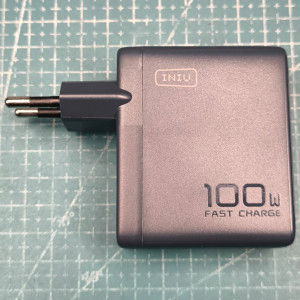
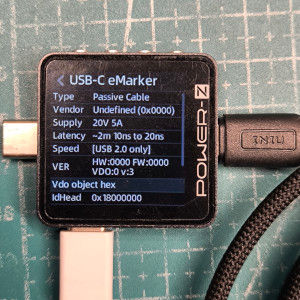
CUKTECH 100W (2C1A) AD1003EU (Amazon.de) (Amazon.com)
Key product benefits:
-
USB-C1/C2 ports support PD3.0 with up to 100W each and identical charging protocols.
-
The USB-A port supports fast charging UFCS 33W according to the test result.
-
PD12V support. It's useful in case you want to replace the conventional AC-DC 12V adapter using the UsbC-DC cable.
-
PPS 5-11V5A support, together with a cable rated for 5A (100W/240W), will provide the fastest Super Fast Charge 2.0 charging for Samsung S22, S23, S24 (Plus and Ultra versions) smartphones.
-
PPS 5-20V5A support, will provide the fastest Super Fast Charge 2.0 charging for Samsung S25 (Plus and Ultra versions) smartphones.
-
When connecting or disconnecting a new device to the charger, power distribution is ensured without interrupting the power supply!
-
Excellent USB-C cable (PVC) 6A-240W PD3.1, 1.5 meters long, with 100mOhm resistance (an excellent result for a length of 1.5m) in a set with a charger. This cable has a 6A rating for Xiaomi's proprietary charging (120W) and is activated with this cable; a regular PD3.0/3.1 cable only activates 100W charging for Xiaomi smartphones from this charger. This is a USB 2.0 cable despite the information in the e-maker chip, as the cable does not contain additional data lines for USB 4.
-
Optimal power distribution between ports (from documentation and confirmed by tests):
-
one port 100W(C1)/100W(C2)/18W(A)
-
two ports 67W(C1)+33W(C2) / 70W(C2)+18W(A)
-
three ports: 45W(C1)+33W(C2)+18W(A)
-
-
Energy efficiency class VI - extremely low energy consumption in standby mode, no need to unplug the charger.
-
Weight: 264g
-
Dimensions (mm): 32x73x56.8 (94.2 with European plug)
Product drawbacks:
-
The PPS protocol is limited to a range of 20V, which will not allow 37W charging for the Google Pixel 9 Pro XL and 45W for the Google Pixel 10 Pro XL.
Supported charging protocols claimed by manufacturer:
-
USB-C1/C2:
-
5V3A, 9V3A, 11V6.1A, 12V3A, 15V3A, 20V5A
-
-
USB-A:
-
5V3A, 9V2A, 10V2.25A, 12V1.5A
-
Supported charging protocols detected by KM003C:
-
USB-C(1-2) ports:
-
PD3.0 100W, PPS, Xiaomi120W (Fixed 5V,9V,12V,15V-3A,20V-5A, PPS: 5-11V5A,5-20V5A)
-
DCP 5V1.5A
-
APPLE 2.4A
-
-
USB-A port:
-
UFCS 33W (5-11V3A)
-
QC2.0/3.0 (5V,9V,12V, 3.6-12V)
-
FCP 24W (5V2A, 9V1.67A,12V1.25A)
-
SCP 20W (5.5V-10V, 0.03A-2A)
-
AFC 24W (5V2A,9V2A,12V2A)
-
DCP 5V1.5A
-
APPLE 2.4A
-

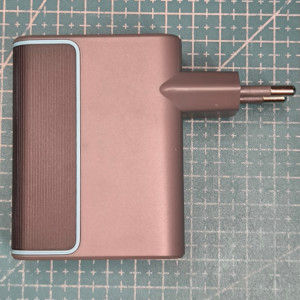

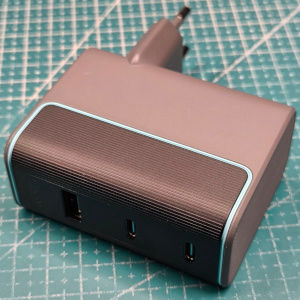


INIU 65W (2C1A) A21-E1 (Amazon.de) (Amazon.com)
Key product benefits:
-
UsbC1 port supports PD3.0 with up to 65W with PPS, but UsbC2 support only PD20W without PPS.
-
PD12V support. It's useful in case you want to replace the conventional AC-DC 12V adapter using the UsbC-DC cable.
-
PPS 5-11V5A support (UsbC1), together with a cable rated for 5A (100W/240W), will provide the fastest Super Fast Charge 2.0 charging for Samsung S22, S23, S24 (Plus and Ultra versions) smartphones.
-
An excellent flexible (braided nylon) 5A-100W USB-C cable, 1.5 meters long, with a resistance of 110mOhm (a very good result) provided together with the charger.
-
Power distribution between ports:
-
one port 65W(C1)/20W(C2)/18W(A)
-
two ports 45W(C1)+20W(C2) / 45W(C1)+18W(A) /7.5W(C2)+7.5W(A)
-
three ports: 45W(C1)+7.5W(C2)+7.5W(A)
-
-
Energy efficiency class VI - extremely low energy consumption in standby mode, no need to unplug the charger.
-
Weight: 137g
-
Dimensions (mm): 31.2x53.8x52.3 (89.4 with European plug)
Product drawbacks:
-
The USB-C1 port supports PPS, but the protocol is limited to a range of 11V, which will not allow 45W charging for the Samsung S25 Plus/Ultra smartphone, 37W for the Google Pixel 9 Pro XL and 45W for the Google Pixel 10 Pro XL.
-
The USB-C2 port supports a maximum of PD 20W and does not support PPS.
-
When connecting/disconnecting the second device, there is a brief interruption of power to the USB-C1 port.
Supported charging protocols claimed by manufacturer:
-
USB-C1/C2:
-
PD 5V3A, 9V3A, 12V3A, 15V3A, 20V5A
-
-
USB-A:
-
5V3A, 9V2A, 10V2.25A, 12V1.5A
-
Supported charging protocols detected by KM003C:
-
USB-C1 port:
-
PD3.0 65W, PPS, QC4+ (Fixed 5V,9V,12V,15V-3A,20V-3.25A, PPS: 5-11V5A)
-
QC2.0/3.0 (5V,9V,12V, 3.6-12V)
-
FCP 18W (5V2A,9V2A,12V1.5A)
-
SCP 22W (3.3-12V, 0.03-2.2A)
-
AFC 24W (5V,9V,12V-2A)
-
MTK PE+1.1/2.0
-
DCP 5V1.5A
-
APPLE 2.4A
-
-
USB-C1 port:
-
PD3.0 20W (Fixed 5V3A,9V2.22A,12V1.67A)
-
QC2.0/3.0 (5V,9V,12V, 3.6-12V)
-
FCP 18W (5V2A,9V2A,12V1.5A)
-
SCP 20W (3.3-12V, 0.03-2A)
-
AFC 24W (5V,9V,12V-2A)
-
MTK PE+1.1/2.0
-
SFCP
-
DCP 5V1.5A
-
APPLE 2.4A
-
-
USB-A port:
-
QC2.0/3.0 (5V,9V,12V, 3.6-12V)
-
FCP 18W (5.2V2A, 9V2A,12V1.5A)
-
SCP 20W (3.3V-12V, 0.03A-2A)
-
AFC 24W (5V2A,9V2A,12V2A)
-
SFCP
-
DCP 5V1.5A
-
APPLE 2.4A
-

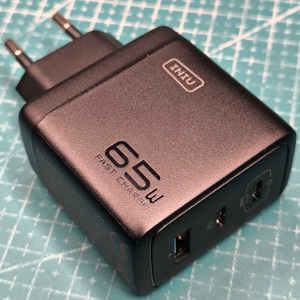


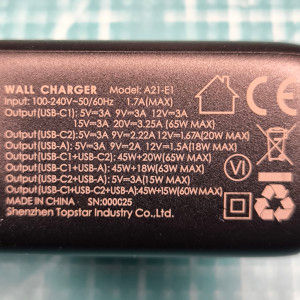

Key product benefits:
-
Built-in overvoltage, overheating, and short circuit protection for the safety of connected devices
-
PD12V support. It's useful in case you want to replace the conventional AC-DC 12V adapter using the UsbC-DC cable.
-
It has power factor correction and energy efficiency class VI - extremely low energy consumption in standby mode, no need to unplug the charger.
-
Weight: 101g
-
Dimensions (mm): 29*55*50 (85 with EU AC plug)
Product drawbacks:
-
It supports only PD protocol and QC4, no PPS and other fast charging protocols. However, Samsung phones can benefit from fast charging through PD protocol even without PPS.
-
Only one UsbC charging port.
Other product notes:
-
You can watch a YouTube video review and test of this power adapter here.
Supported charging protocols claimed by manufacturer:
-
UsbC 65W: 5V,9V,12V,15V-3A, 20V-3.25A
Supported charging protocols detected by KM003C:
USB-C port:
-
PD3.0 65W (Fixed 5V,9V,12V,15V-3A,20V-3.25A)
-
DCP 5V1.5A



CUKTECH GaN 65W (2C1A) (Amazon.de) (Amazon.com)
Key product benefits:
-
Supports Xiaomi Hypercharge 65W charging protocol via USB-C1 connector without the need for a proprietary UsbC-UsbC cable.
-
PD12V support. It's useful in case you want to replace the conventional AC-DC 12V adapter using the UsbC-DC cable.
-
PPS 5-11V5A support, together with a cable rated for 5A (100W/240W), will provide the fastest possible Super Fast Charge 2.0 45W charging for Samsung S22, S23 and S24 smartphones (Plus and Ultra versions).
-
3 USB cable connection ports.
-
Energy efficiency class VI - extremely low power consumption in standby mode, so you don't have to unplug the charger from the outlet.
-
Power distribution for multi-port connection:
-
USB-C1 + USB-C2 = 45W + 25W
-
USB-C1 + USB-A = 45W + 18W
-
USB-C2 + USB-A = 5V maximum total power 20W
-
USB-C1 + USB-C2 + USB-A = 45W (USB-C1) + 5V maximum total power 15W (USB-C2 + USB-A)
-
Weight: 123g
-
Dimensions (mm): 27x52x44 (93 with EU AC plug)
Product drawbacks:
-
When connecting or disconnecting the second charging device, the power to all connected devices is turned off for approximately 2 seconds.
Supported charging protocols claimed by manufacturer:
-
USB-C1 65W: 5V3A, 9V3A, 11V4A, 12V3A, 15V3A, 20V3.25A
-
USB-C2 33W: 5V3A, 9V3A, 11V3A, 12V2.5A
-
USB-A 5V3A, 9V2A, 10V2.25A, 12V1.5A
Supported charging protocols detected by KM003C:
UsbC1 port:
-
PD3.0 65W (Fixed 5V,9V,12V,15V-3A,20V-3.25A),
-
PD3.0 PPS 65W: 5-11V5A, 5-20V3.25A
-
QC2.0/3.0 (5V,9V,12V, 3.6-12V)
-
DCP 5V1.5A
UsbC2 port:
-
PD3.0 30W (Fixed 5V3A,9V3A,12V2.5A),
-
PD3.0 PPS 33W 5-11V3A
-
QC2.0/3.0 (5V,9V,12V, 3.6-12V)
-
Samsung 2A
-
Apple 2.4A
-
DCP 5V1.5A
UsbA port:
-
QC2.0/3.0 (Fixed 5V, 9V, 12V, QC3.0: 3.6-12V)
-
SCP 3.3-12V, 22W
-
Samsung 2A
-
Apple 2.4A
-
DCP 5V1.5A
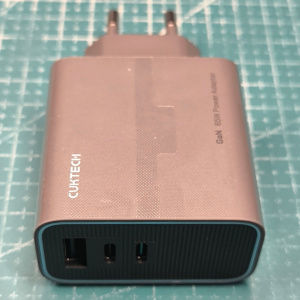



Baseus Picogo 67W (2C1A) (Amazon.de) (Amazon.com) (AliExpress)
Key product benefits:
-
Very compact and lightweight adapter.
-
Both USB-C ports are equally functional.
-
PD12V support. It's useful in case you want to replace the conventional AC-DC 12V adapter using the UsbC-DC cable.
-
PPS 5-11V5A support, together with a cable rated for 5A (100W/240W), will provide the fastest possible Super Fast Charge 2.0 45W charging for Samsung S22, S23 and S24 smartphones (Plus and Ultra versions).
-
3 USB cable connection ports.
-
Power distribution between ports (information from the manufacturer):
-
One port: USB-C1/C2 - 67W, USB-A - 33W
-
Two ports:
-
USB-C1+USB-C2=45W+20W
-
USB-C1/C2 + USB-A = 45W + 18W
-
-
Three ports: USB-C1 + USB-C2 + USB-A = 45W + 18W + 4W
-
Product drawbacks:
-
When connecting or disconnecting a second charging device, power is cut off to all connected devices.
-
Not the highest efficiency - 84% (average), 73.5% (10% load)
-
No energy efficiency class VI certification (standby power consumption 0.161W)
Supported charging protocols claimed by manufacturer:
-
UsbC1/С2 67W: 5V3A, 9V3A, 12V3A, 15V3A, 20V3.35A
-
UsbA 5V3A, 9V3A, 12V2.5A
Supported charging protocols detected by KM003C:
UsbC1/С2 ports:
-
PD3.0 67W Fixed: 5V,9V,12V,15V-3A,20V-3.35A
-
PD3.0 PPS: 5-11V5A
-
AFC 24W: 5,9,12V-2A
-
SCP 22W: 5.5V-10V, 0.03A-2A
-
FCP 15W: 5V2A,9V1.67A, 12V1.25A
-
QC2.0/3.0 (5V,9V,12V,20V, 3.6-20V)
-
Apple 2.4A
-
DCP 5V1.5A
UsbA port:
-
AFC 24W: 5,9,12V-2A
-
SCP 22W: 5.5V-10V, 0.03A-2A
-
FCP 15W: 5V2A,9V1.67A, 12V1.25A
-
QC2.0/3.0 (Fixed 5V,9V,12V, QC3.0: 3.6-12V)
-
UFCS 33W (5-11V3A)
-
Apple 2.4A
-
DCP 5V1.5A



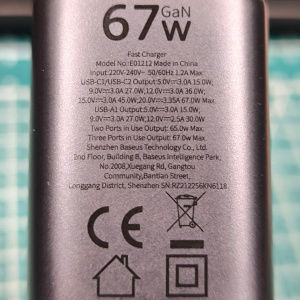
Key product benefits:
-
Fast charging Xiaomi smartphones up to 120W!
-
GaN technology allows to get over 90% energy conversion (AC->DC) and low power idle consumption
-
The charger is certified for the 6-class energy efficiency
-
Original UsbA-UsbC cable allows you to switch to PD3.0 fast charging protocol (65W) and charge laptops or other smartphones.
-
Weight: 167g
-
Dimensions (mm): 28x55x59 (100 with EU AC plug)
Product drawbacks:
-
Only one UsbA port, no UsbC ports
-
Lack of variety of fast charging protocols
Other product notes:
-
120W of fast charging for Xiaomi smartphones is possible only with the original Xiaomi 6A cable
Supported charging protocols claimed by manufacturer:
-
USB-A: 120W max, 5V3A, 9V3A, 11V6A, 20V6A
Supported charging protocols detected by KM003C:
USB-A port:
-
QC2.0/3.0 (5V, 9V, 12V, 3.6-20V) - any cable
-
PD3.0 65W (Fixed 5V,9V,15V-3A,20V-3.25A) - only proprietary Xiaomi cable
-
Xiaomi Hypercharge (PPS mode) 96W: (3.6V-11V 6A, 3.6V-20V 4.8A) - only with proprietary Xiaomi cable.
-
DCP 5V1.5A - any cable



PD3.1 140W buck-boost module LM5175+IP2736 (AliExpress) (Amazon.de) (Amazon.com)
Key product benefits:
-
Support for 12-32V DC input is claimed (testing confirmed that the module works from 5V under a 10A load!), via a 5.5x2.5mm plug (5.5x2.1mm is not suitable!).
-
1 UsbC PD3.1 output.
-
This is a buck-boost module, it can both lower the voltage and increase it, for example, from 5V to 20V, which is a very convenient feature.
-
There are three versions of this module: in an aluminum housing, transparent acrylic, and without a housing.
-
The module has excellent efficiency: 96% (according to test results), which, combined with the aluminum plate on the bottom of the module, provides excellent temperature control results (the temperature at the hottest point did not rise above 47 degrees Celsius at a load of up to 90W for 15 minutes).
-
PD12V support. It's useful in case you want to replace the conventional AC-DC 12V adapter using the UsbC-DC cable.
-
PPS 21V support is important for some smartphones, such as the Google Pixel 9 Pro XL or Google Pixel 10 Pro XL (37W and 45W respectively), and can only be achieved if the charger supports the PPS 21V protocol.
-
PPS 3.3-21V5A support, together with a cable rated for 5A (100W/240W), will provide the fastest possible Super Fast Charge 2.0 45W charging for Samsung S22, S23, S24 and S25 smartphones (Plus and Ultra versions).
-
Weight: 105g (with aluminum case)
-
Dimensions(mm): 30x50x70.5 (aluminum case)
Product drawbacks:
-
DC 5.5x2.1mm jack is not compatible with the adapter's DC 5.5x2.5mm input.
-
No AVS protocol support.
Other product notes:
-
You can use any Laptop charger as a DC source with a 5.5x2.5 jack or with a 5.5x2.5 jack adapter.
Supported charging protocols detected by KM003C:
-
USB-C port:
-
PD3.1 140W, PPS, QC5 (Fixed 5V,9V,12V,15V-3A,20V-5A, 28V-5A, PPS: 3.3-21V-5A)
-
FCP 18W (5.2V2A, 9V2A,12V1.5A)
-
SCP 22W (3.3V-12V, 0.03-2.2A)
-
AFC 24W (5V2A,9V2A,12V2A)
-
QC2.0/3.0 (5V, 9V, 12V,20V, 3.6-20V)
-
MTK PE+ / MTK PE+2.0
-
DCP
-
APPLE 2.4A
-
Samsung 2A
-
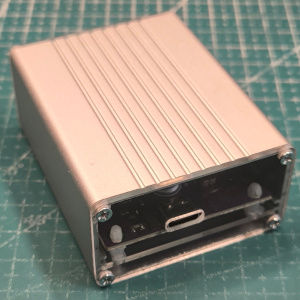
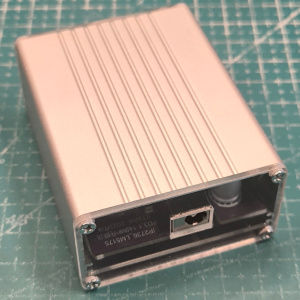
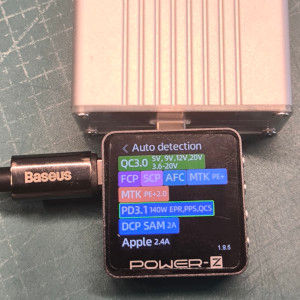
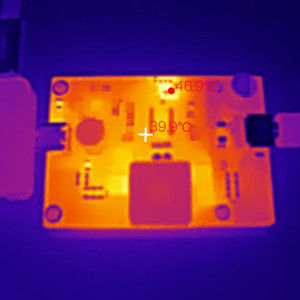
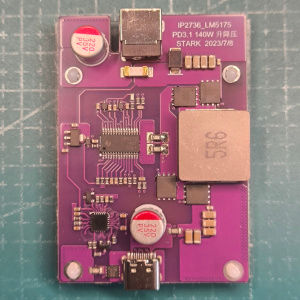
Key product benefits:
-
DC input 5V-24V using common 5.5x2.5mm jack.
-
2 UsbC output PD3.0 (5-15V3A, 20V5A - 100W per each plug even with simultaneous use)
-
2 UsbA output QC3.0 (5-9V/3A, 12V2.5A - 30W per each plug but when using both ports at the same time 15W+15W)
-
It is a buck-boost module, it can not only reduce voltage but also boost, for example from 12V to 20V, which is quite a useful and outstanding feature.
-
Soft silicon anti-shock heat-resistant bumper.
-
PD12V support. It's useful in case you want to replace the conventional AC-DC 12V adapter using the UsbC-DC cable.
-
PPS 21V support is important for some smartphones, such as the Google Pixel 9 Pro XL or Google Pixel 10 Pro XL (37W and 45W respectively), and can only be achieved if the charger supports the PPS 21V protocol.
-
Very low idle power consumption! - it's only 0.03Wh.
-
Weight: 79g
-
Dimensions(mm): 23x51x74 (with silicon bumper)
Product drawbacks:
-
DC 5.5x2.1mm jack is not compatible with the adapter's DC 5.5x2.5mm input.
Other product notes:
-
You can use any Laptop charger as a DC source with a 5.5x2.5 jack or with a 5.5x2.5 jack adapter.
-
Video-review of this device.
Supported charging protocols claimed by manufacturer:
-
UsbC:
-
PD3.0, PPS, QC2.0-4.0, Apple, FCP, SCP, AFC, SFCP, PE
-
100W, 5-15V3A, 20V5A
-
-
UsbA:
-
QC2.0-3.0, Apple2.4A, FCP, SCP, AFC, PE
-
30W 5-9V/3A, 12V2.5A
-
Supported charging protocols detected by KM003C:
-
USB-C port (both ports):
-
PD3.0 100W, PPS, QC5 (Fixed 5V,9V,12V,15V-3A,20V-5A, PPS: 3.3-21V-3A)
-
FCP 18W (5.2V2A, 9V2A,12V1.5A)
-
SCP - not detected
-
AFC 18W (5V2A,9V2A)
-
QC2.0/3.0 (5V, 9V, 12V, 3.6-12V)
-
SFCP - not detected
-
MTK PE - not detected
-
BC1.2(DCP 5V1.5A)
-
APPLE 2.4A
-
-
USB-A port (both ports):
-
FCP 18W (5.2V2A, 9V2A,12V1.5A)
-
SCP 22W (3.3V-5.5V, 0.03A-5A)
-
AFC 18W (5V2A,9V2A,12V2A)
-
QC2.0/3.0 (5V, 9V, 12V, 3.6-12V)
-
MTK PE+1.1/2.0
-
BC1.2(DCP 5V1.5A)
-
APPLE 2.4A
-


Product key benefits:
-
Aluminium case which also helps cool down the device.
-
A screen that shows the output voltage and current.
-
Input DC12-28V 5.5x2.1mm jack (5.5x2.5 might not fit!) or UsbC (PD). UsbC and UsbA output (various fast charging protocols supported). According to the tests, the adapter was functional even with 6V DC input!.
-
It's recommended to use at least DC 21V input in order to get maximum PD20V5A (100W) output or PD 20V5A input.
-
PD12V support. It's useful in case you want to replace the conventional AC-DC 12V adapter using the UsbC-DC cable.
-
PPS 21V support is important for some smartphones, such as the Google Pixel 9 Pro XL or Google Pixel 10 Pro XL (37W and 45W respectively), and can only be achieved if the charger supports the PPS 21V protocol.
-
PPS 3.3-21V5A support, together with a cable rated for 5A (100W/240W), will provide the fastest possible Super Fast Charge 2.0 45W charging for Samsung S22, S23, S24 and S25 smartphones (Plus and Ultra versions).
-
You can connect to a USB PD adapter, which for example does not support PPS 21V or PD12V and get the charging protocols you need from this adapter.
-
Support for the very rare PD 5V5A mode! This sub-standard protocol is required for Raspberry PI 5
-
Relatively cheap device (11-15 USD on AliExpress)
-
Weight: 58g
-
Dimensions (mm): 21.2x46x54
Product drawbacks:
-
Only buck (step down) module. it can't make a higher voltage output than input voltage.
-
When both USB ports are used simultaneously, charging on both ports switches to using the basic DCP protocol at 5V.
Other product notes:
-
Idle power consumption 0.6W
-
You can use the car's 12V output as a DC source.
-
You can use any Laptop charger as a DC source with a 5.5x2.5 jack or with a 5.5x2.5 jack adapter.
Supported charging protocols claimed by manufacturer:
-
PD2.0 PD3.0 PPS
-
QC4+/QC3.0
-
Huawei SCP/FCP
-
VOOC/ Dash
-
Apple 2.4A.
-
Samsung AFC
-
VIVO 9V2A double motor.
-
PE+2.0
Supported charging protocols detected by KM003C:
-
USB-C port:
-
PD3.0 100W, PPS, QC5 (Fixed (5V,9V,12V,15V,20V)-5A, PPS: 3.3-21V-5A)
-
FCP 24W (5V2A, 9V2A,12V2A)
-
SCP 25W (3.4V-5.5V, 0.5A-5A)
-
AFC 24W (5V2A,9V2A,12V2A)
-
QC2.0/3.0 (5V, 9V, 12V,20V, 3.6-20V)
-
SFCP (5V, 9V, 12V)
-
MTK PE+1.1/2.0
-
BC1.2(DCP 5V1.5A)
-
SAMSUNG 5V2A
-
APPLE 2.4A
-
-
USB-A port:
-
FCP 24W (5V2A, 9V2A,12V2A)
-
SCP 25W (3.4V-5.5V, 0.5A-5A)
-
AFC 24W (5V2A,9V2A,12V2A)
-
QC2.0/3.0 (5V, 9V, 12V,20V, 3.6-20V)
-
SFCP (5V, 9V, 12V)
-
MTK PE+1.1/2.0
-
BC1.2(DCP 5V1.5A)
-
SAMSUNG 5V2A
-
APPLE 2.4A
-
VOOC
-



Product key benefits:
-
3 output ports 2 UsbC, 1 UsbA
-
Operation of all three ports is independent and the power supply is not changed when a new device is connected.
-
Supports 12V and 24V on-board vehicle power supply.
-
The voltage of the on-board network of a car does not affect the charging characteristics of the device.
-
The adapter is built on the principle of buck-boost ie can decrease or increase the output voltage depending on the request of the charged device.
-
PPS 5-11V5A support, together with a cable rated for 5A (100W/240W), will provide the fastest possible Super Fast Charge 2.0 45W charging for Samsung S22, S23 and S24 smartphones (Plus and Ultra versions).
-
The kit comes with a quality UsbC-UsbC cable 1m with support for 100W (20V5A) and Usb3.2, resistance 120mOhm.
-
Weight: 51grams
-
Diameter (head):36mm, Length:81mm
Product drawbacks:
-
Considering the weight and compact size of the adapter, such a device will not be able to provide 167.5W for a long time without overheating.
Supported charging protocols claimed by manufacturer:
-
UsbC1:
-
PD3.0: 5V3A, 9V3A, 15V3A, 20V3A
-
-
UsbC2:
-
PD3.0: 5V3A, 9V3A
-
PPS (5-11V5A) - max 45W
-
-
UsbA:
-
5V3A, 9V2A, 10V2.25A (22.5W max)
-
Supported charging protocols detected by KM003C:
-
USB-C1 port:
-
PD3.0 100W, PPS, QC4+ (Fixed 5V,9V,15V-3A, 20V5A, PPS: 5-11V5A)
-
FCP 18W (5.2V2A, 9V2A)
-
SCP 22W (3.3V-10V, 0.03A-2.2A)
-
AFC 18W (5V2A,9V2A)
-
QC2.0/3.0 (5V, 9V, 12V, 3.6-12V)
-
BC1.2(DCP 5V1.5A)
-
APPLE 2.4A
-
-
USB-C2 port:
-
PD3.0 27W, PPS, QC4+ (Fixed 5V,9V-3A, PPS: 5-11V5A)
-
FCP 18W (5.2V2A, 9V2A)
-
SCP 22W (3.3V-10V, 0.03A-2.2A)
-
AFC 18W (5V2A,9V2A)
-
QC2.0/3.0 (5V, 9V, 3.6-9V)
-
BC1.2(DCP 5V1.5A)
-
APPLE 2.4A
-
-
USB-A port:
-
FCP 18W (5.2V2A, 9V2A)
-
SCP 22W (3.3V-10V, 0.03A-2.2A)
-
AFC 18W (5V2A,9V2A)
-
QC2.0/3.0 (5V, 9V, 3.6-9V)
-


Product key benefits:
-
USB 3.1, 10Gbps bandwidth
-
Converting UsbA port to UsbC port for charging or data transmission.
Product drawbacks:
-
Based on actual measurements, the charging modes in terms of power and voltage differ slightly from the product specifications.
Supported charging protocols claimed by manufacturer:
-
QC input: 5V3A/9V2A/12V1.5A/20V1.6A
-
PD output: 5V3A/9V2A/12V1.5A/20V1.6A
Supported charging protocols detected by KM003C:
USB-C port:
-
DCP
-
MTK PE+1.1/2.0
-
PD3.0 18W, Fixed: 5V2A, 9V2A, 12V1.5A

PD 65W module (Amazon.de) (Amazon.com) (AliExpress)
Product key benefits:
-
Input voltage range: DC 8V-30V
-
This is a Buck module, it cannot increase voltage, i.e. if you connect a 12V DC source, the output voltage will also be limited to a maximum of 12V.
-
There are three versions of the module with DC inputs: 5.5x2.5, 5.5x2.1, and Standard with open contact pads +/-.
-
Acceptable heating level, possible operation without a heat sink - maximum temperature 70-75°C on the chip at full load for 30 minutes.
-
PD12V support. It's useful in case you want to replace the conventional AC-DC 12V adapter using the UsbC-DC cable.
-
PPS 21V support is important for some smartphones, such as the Google Pixel 9 Pro XL or Google Pixel 10 Pro XL (37W and 45W respectively), and can only be achieved if the charger supports the PPS 21V protocol.
-
PPS 3.3-21V3A support support will also enable the fastest Super Fast Charge 2.0 45W charging for Samsung S25 smartphone (Plus and Ultra versions).
-
A fairly inexpensive module, costing about $2.50 on AliExpress.
-
Weight: 6.4g (Standard version)
-
Dimensions: Standard: 32×20×10mm / With DC Port: 44×20×10mm
3D models suitable for this device:
Product drawbacks:
-
This is a Buck module, it cannot increase voltage. When powered by 12V (e.g., from a car battery), you will not be able to charge a laptop, and the power will be limited to 36W (12V3A).
Supported charging protocols claimed by manufacturer:
-
Max 65W (5V/3A, 9V/3A, 12V/3A, 20V/3.25A)
-
PD3.1 (PPS), QC3.0, SCP, FCP, AFC, Apple Fast Charge, MTK PE+1.1/2.0
Supported charging protocols detected by KM003C:
24V input:
-
PD3.0 65W, PPS, QC5 (Fixed 5V,9V,12V,15V-3A, 20V3.25A, PPS: 3.3-16V3.25A, 3.3-21V3A)
-
AFC 18W (5V2A,9V2A)
-
FCP 24W (5V2A, 9V2A, 12V2A)
-
QC2.0/3.0 (5V, 9V, 12V, 20V, 3.6-20V)
-
MTK PE+
-
BC1.2(DCP 5V1.5A)
-
APPLE 2.4A
16-12V input:
-
PD3.0 36W, PPS, QC4+ (Fixed 5V,9V,12V-3A, PPS: 3.3-12V3.25A)
-
AFC 18W (5V2A,9V2A)
-
FCP 24W (5V2A, 9V2A, 12V2A)
-
QC2.0/3.0 (5V, 9V, 12V, 3.6-12V)
-
MTK PE+
-
BC1.2(DCP 5V1.5A)
-
APPLE 2.4A

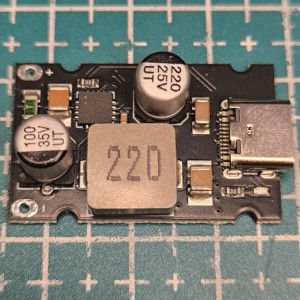
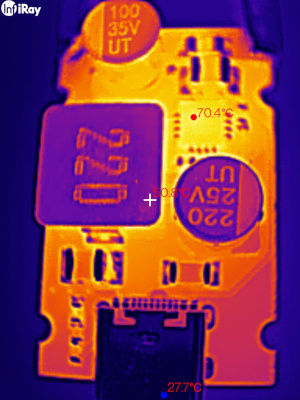
SW3518 buck modules (1C1A) (Amazon.de) (Amazon.com) (AliExpress)
Product key benefits:
-
Input voltage range: DC 6V-32V
-
This is a Buck module, it cannot increase voltage, i.e. if you connect a 12V DC source, the output voltage will also be limited to a maximum of 12V. (12V3A=36W).
-
There are three versions of the module: Single/Double/Quadro. These are the same module, only multiplied on a common board and having a common DC input. The double and quadro modules operate completely independently of each other.
-
Acceptable module heating, possible operation without a heat sink - maximum temperature 72°C on one of the chips and 66°C on the choke at a maximum load of 60W for 30 minutes.
-
PD12V support. It's useful in case you want to replace the conventional AC-DC 12V adapter using the UsbC-DC cable.
-
PPS 21V support is important for some smartphones, such as the Google Pixel 9 Pro XL or Google Pixel 10 Pro XL (37W and 45W respectively).
-
PPS 3.3-21V3A support support will also enable the fastest Super Fast Charge 2.0 45W charging for Samsung S25 smartphone (Plus and Ultra versions).
-
The measured efficiency of the module is about 94%, which allows it to remain within acceptable temperature limits without using a heat sink.
-
There is built-in protection against overvoltage.
-
It is a fairly inexpensive module, with the Single version costing around $3 on AliExpress.
-
There is also a version of the module with an SW3516 chip, which does not support the VOOC charging protocol, unlike the SW3518P which is installed in the tested module.
-
Weight: Single: 12g , Double: 28.4g
-
Dimensions: Single: 51×18×12.5mm, Double: 64x36x13mm
Product drawbacks:
-
This is a Buck module, it cannot increase voltage. When powered by 12V (e.g., from a car battery), you will not be able to charge a laptop, and the power will be limited to 36W (12V3A).
-
The double module version that I tested behaved unusually: PD100W support was detected when connecting a load (laptop), the PD100W protocol was established, but as the power consumption of the load increased, the protection was triggered after 2-3 seconds and the charge was interrupted. Limiting the power (with a cable) to 60W did not fix the problem. The same stability issue was observed with PD45W (15V3A), and only with PD36W (12V3A) did everything work as it should. At the same time, the single version of the module worked perfectly with PD60W (20V3A). There is a suspicion that the double version of the module which was used in this testing is defective.
-
Simultaneous operation of both ports (USB-A and USB-C) is not stable, despite the manufacturer's claim operability of 5V on both ports.
3D models suitable for this device:
Supported charging protocols claimed by manufacturer:
-
USB PD3.0(PPS), Qualcomm QC4+/QC3.0, Huawei SCP/FCP, Apple 2.4A, Samsung AFC, VIVO 9V2A, MediaTek PE2.0, OPPO VOOC support (only supported by 3518), OnePlus DASH support (only supported by 3518)
Supported charging protocols detected by KM003C:
UsbC port:
24V input:
-
PD3.0 60W, PPS (Fixed 5V,9V,12V,15V,20V3A, PPS: 3.3-21V3A)
-
AFC 24W (5V2A,9V2A,12V2A)
-
SCP 40W (3.3V-12V, 0.03-4A)
-
FCP 24W (5V2A, 9V2A, 12V2A)
-
QC2.0/3.0 (5V, 9V, 12V, 20V, 3.6-20V)
-
MTK PE+, MTK PE+2.0
-
SFCP
-
Samsung 2A
-
APPLE 2.4A
-
DCP
16V input:
-
PD3.0 45W, PPS (Fixed 5V,9V,12V,15V3A, PPS: 3.3-16V3A)
-
QC2.0/3.0 (5V, 9V, 12V, 3.6-12V)
-
Other protocols are the same as above
13-12V input:
-
PD3.0 36W, PPS, QC4+ (Fixed 5V,9V,12V-3A, PPS: 3.3-11V3A)
-
QC2.0/3.0 (5V, 9V, 12V, 3.6-12V)
-
Other protocols are the same as above
UsbA port:
24V input:
-
AFC 24W (5V2A,9V2A,12V2A)
-
SCP 40W (3.3V-12V, 0.03-4A)
-
FCP 24W (5V2A, 9V2A, 12V2A)
-
QC2.0/3.0 (5V, 9V, 12V, 20V, 3.6-20V)
-
MTK PE+, MTK PE+2.0
-
Samsung 2A
-
APPLE 2.4A
-
VOOC (4A)
-
DCP
16-12V input:
-
QC2.0/3.0 (5V, 9V, 12V, 3.6-12V)
-
Other protocols are the same as above
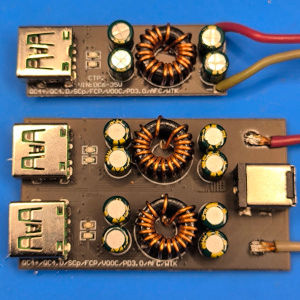
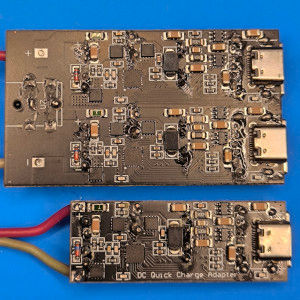

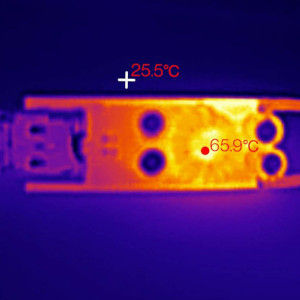
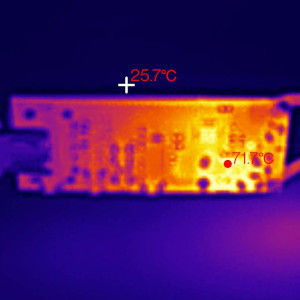
SW2303 PL5501 module (1C) (Amazon.de) (Amazon.com) (AliExpress)
Product key benefits:
-
Input voltage range: DC 3V-24V
-
This is a Buck-Boost module that lowers or raises the input voltage to the target voltage. For example, you can connect a 12V power supply to the input and charge a laptop using the PD20V protocol, or vice versa, use a 21V power supply and charge USB devices with any available voltage from 5V and above.
-
In terms of module heating, it operates stably at a power of about 60W (up to 75°C), but when the power increases to a maximum of 90-100W, the MOSFETs (90-95°C) located around the choke (there are 4 of them, 2 are used for buck mode, and the other 2 for boost), as well as the fuse (green) - 110-120°C. If heating is normal for the fuse, it is recommended to install small heat sinks on the MOSFETs (or at least on the back side of the module) if the module is expected to be loaded for more than 60W for a long time.
-
PD 12V support. This is very useful if you want to replace a regular AC-DC12V adapter. To do this, you will need a USB-C to DC cable.
-
PPS 3.3-21V5A support - provides the maximum possible charging power for Samsung smartphones of any model, including Ultra and Plus versions, as well as Google Pixel 9 Pro XL and Google Pixel 10 Pro XL.
-
The DC 5.5x2.1mm input power port simplifies the connection of a power source, and there are also contact pads for direct power supply.
-
The module board has contacts for connecting active cooling (fan).
-
Weight:21g
-
Dimensions: 37.1×73.4×14.4mm
Product drawbacks:
-
Using the module to power high-power consumers > 60W (e.g., a laptop) requires the installation of heat sinks on the MOSFETs.
3D models suitable for this device:
Supported charging protocols claimed by manufacturer:
-
PD, QC, FCP, high and low voltage SCP, AFC, SFCP and PE
Supported charging protocols detected by KM003C:
UsbC port:
3-24V input:
-
PD3.0 100W, PPS (Fixed 5V,9V,12V,15V-3A,20V5A, PPS: 3.3-21V5A)
-
AFC 24W (5V2A,9V2A,12V2A)
-
SCP 25W (3.3V-5.5V, 0.03-5A)
-
FCP 24W (5V2A, 9V2A, 12V2A)
-
QC2.0/3.0 (5V, 9V, 12V, 3.6-20V)
-
MTK PE+, MTK PE+2.0
-
SFCP
-
Samsung 2A
-
APPLE 2.4A
-
DCP




SW3538 140W Black module (1C1A) (Amazon.de) (Amazon.com) (AliExpress)
Product key benefits:
-
Input voltage range: DC 6V-30V
-
This is a buck (step-down) module that can only lower the voltage to the target value.
-
PD 12V support is implemented. This is very useful if you want to replace a regular AC-DC12V adapter. To do this, you will need a USB-C to DC cable.
-
PPS 21V5A support allows you to charge all Samsung models at maximum power, including Plus and Ultra versions (S22-S25), as well as Google Pixel 9 Pro XL or Google Pixel 10 Pro XL (37W and 45W, respectively).
-
The DC 5.5x2.1mm input power port simplifies connection to the power source.
-
The module has a red LED indicator for connection to the power source.
-
Impressive size heat sink on the back of the module.
-
Large size choke.
-
Support for SVOOC and VOOC protocols (confirmed by testing), as well as TFCP (from the SW3528 datasheet).
-
Weight: 29g
-
Dimensions: 32×67.5×17.6mm
Product drawbacks:
-
No PD3.1 support, and 140W is achieved by a non-standard version of the PD3.0 protocol (20V7A)
3D models suitable for this device:
Supported charging protocols claimed by manufacturer:
-
Supports full gear PPS3.3-21V 6.3A 133W
-
Support PD140W 20V7A@140W
-
Support QC5/QC4+/QC3+/QC2.0
-
Support AFC/FCP/High Voltage SCP/SFCP
Additional information about protocol support from the SW2303 chip datasheet:
-
Supports TFCP protocol; provides four power curves: 25 W / 33 W / 45 W / 65 W
-
Supports SFCP protocol; outputs 5 V / 9 V / 12 V.
-
Supports VOOC protocol. VOOC1.0 output support
Supported charging protocols detected by KM003C:
UsbC port:
>21V input:
-
PD3.0 140W, PPS (Fixed 5V,9V,12V,15V-3A,20V7A, PPS: 3.3-21V6.35A)
-
AFC 24W (5V2A, 9V2A, 12V2A)
-
SCP 22W (3.3V-12V, 0.03-4A)
-
FCP 24W (5V2A, 9V2A, 12V2A)
-
QC2.0/3.0+ (5V, 9V, 12V, 3.6-20V)
-
SVOOC, VOOC
-
MTK PE+, MTK PE+2.0
-
SFCP
-
Samsung 2A
-
APPLE 2.4A
-
DCP
17V input:
-
PD3.0 45W, PPS (Fixed 5V,9V,12V,15V-3A, PPS: 3.3-16V5A)
-
AFC 24W (5V2A, 9V2A, 12V2A)
-
SCP 22W (3.3V-12V, 0.03-4A)
-
FCP 24W (5V2A, 9V2A, 12V2A)
-
QC2.0/3.0+ (5V, 9V, 12V, 3.6-12V)
-
SVOOC, VOOC
-
MTK PE+, MTK PE+2.0
-
SFCP
-
Samsung 2A
-
APPLE 2.4A
-
DCP
14V input:
-
PD3.0 36W, PPS (Fixed 5V,9V,12V-3A, PPS: 3.3-11V5A)
-
AFC 24W (5V2A, 9V2A, 12V2A)
-
SCP 22W (3.3V-12V, 0.03-4A)
-
FCP 24W (5V2A, 9V2A, 12V2A)
-
QC2.0/3.0+ (5V, 9V, 12V, 3.6-12V)
-
SVOOC, VOOC
-
MTK PE+, MTK PE+2.0
-
SFCP
-
Samsung 2A
-
APPLE 2.4A
-
DCP
UsbA port:
>21V input:
-
AFC 24W (5V2A, 9V2A, 12V2A)
-
SCP 22W (3.3V-12V, 0.03-4A)
-
FCP 24W (5V2A, 9V2A, 12V2A)
-
QC2.0/3.0+ (5V, 9V, 12V, 3.6-20V)
-
SVOOC, VOOC
-
MTK PE+, MTK PE+2.0
-
SFCP
-
Samsung 2A
-
APPLE 2.4A
-
DCP
14-17V input:
-
AFC 24W (5V2A, 9V2A, 12V2A)
-
SCP 22W (3.3V-12V, 0.03-4A)
-
FCP 24W (5V2A, 9V2A, 12V2A)
-
QC2.0/3.0+ (5V, 9V, 12V, 3.6-12V)
-
SVOOC, VOOC
-
MTK PE+, MTK PE+2.0
-
SFCP
-
Samsung 2A
-
APPLE 2.4A
-
DCP


SW3538 140W Blue module (1C1A) (AliExpress)
Product key benefits:
-
Input voltage range: DC 6V-30V
-
This is a buck (step-down) module that can only lower the voltage to the target value.
-
PD 12V support is implemented. This is very useful if you want to replace a regular AC-DC12V adapter. To do this, you will need a USB-C to DC cable.
-
PPS 21V5A support allows you to charge all Samsung models at maximum power, including Plus and Ultra versions (S22-S25), as well as Google Pixel 9 Pro XL or Google Pixel 10 Pro XL (37W and 45W, respectively).
-
The DC 5.5x2.1mm input power port simplifies connection to the power source.
-
The module has a red LED indicator for connection to the power source.
-
Impressive size heat sink on the back of the module.
-
Large size choke.
-
Support for SVOOC and VOOC protocols (confirmed by testing), as well as TFCP (from the SW3528 datasheet).
-
Weight: 14.2g
-
Dimensions: 27.2×50.4×11.3mm
Product drawbacks:
-
No PD3.1 support
-
There is no actual support for 140W despite the statement on the product page; only 100W 20V5A is available. Another module built on the same SW3538 chip supports non-standard PD3.0 140W 20V7A.
Supported charging protocols claimed by manufacturer:
-
Support PPS/PD3.0/PD2.0
-
Support QC5/QC4+/QC3+/QC3.0/QC2.0- Support AFC
-
Support FCP
-
Supports high and low voltage SCP - Supports PE2.0/PE1.1- Supports SFCP
-
Support TFCP - Support VoOc
-
PD/SCP/V00C supports MCU
Additional information about protocol support from the SW2303 chip datasheet:
-
Supports TFCP protocol; provides four power curves: 25 W / 33 W / 45 W / 65 W
-
Supports SFCP protocol; outputs 5 V / 9 V / 12 V.
-
Supports VOOC protocol. VOOC1.0 output support
Supported charging protocols detected by KM003C:
UsbC port:
>21V input:
-
PD3.0 100W, PPS (Fixed 5V,9V,12V,15V-3A,20V5A, PPS: 3.3-21V5A)
-
AFC 24W (5V2A, 9V2A, 12V2A)
-
SCP 22W (3.3V-12V, 0.03-4A)
-
FCP 24W (5V2A, 9V2A, 12V2A)
-
QC2.0/3.0+ (5V, 9V, 12V, 3.6-20V)
-
SVOOC, VOOC
-
MTK PE+, MTK PE+2.0
-
SFCP
-
Samsung 2A
-
APPLE 2.4A
-
DCP
17V input:
-
PD3.0 45W, PPS (Fixed 5V,9V,12V,15V-3A, PPS: 3.3-16V5A)
-
AFC 24W (5V2A, 9V2A, 12V2A)
-
SCP 22W (3.3V-12V, 0.03-4A)
-
FCP 24W (5V2A, 9V2A, 12V2A)
-
QC2.0/3.0+ (5V, 9V, 12V, 3.6-12V)
-
SVOOC, VOOC
-
MTK PE+, MTK PE+2.0
-
SFCP
-
Samsung 2A
-
APPLE 2.4A
-
DCP
14V input:
-
PD3.0 36W, PPS (Fixed 5V,9V,12V-3A, PPS: 3.3-11V5A)
-
AFC 24W (5V2A, 9V2A, 12V2A)
-
SCP 22W (3.3V-12V, 0.03-4A)
-
FCP 24W (5V2A, 9V2A, 12V2A)
-
QC2.0/3.0+ (5V, 9V, 12V, 3.6-12V)
-
SVOOC, VOOC
-
MTK PE+, MTK PE+2.0
-
SFCP
-
Samsung 2A
-
APPLE 2.4A
-
DCP
UsbA port:
>21V input:
-
AFC 24W (5V2A, 9V2A, 12V2A)
-
SCP 22W (3.3V-12V, 0.03-4A)
-
FCP 24W (5V2A, 9V2A, 12V2A)
-
QC2.0/3.0+ (5V, 9V, 12V, 3.6-20V)
-
SVOOC, VOOC
-
MTK PE+, MTK PE+2.0
-
SFCP
-
Samsung 2A
-
APPLE 2.4A
-
DCP
14-17V input:
-
AFC 24W (5V2A, 9V2A, 12V2A)
-
SCP 22W (3.3V-12V, 0.03-4A)
-
FCP 24W (5V2A, 9V2A, 12V2A)
-
QC2.0/3.0+ (5V, 9V, 12V, 3.6-12V)
-
SVOOC, VOOC
-
MTK PE+, MTK PE+2.0
-
SFCP
-
Samsung 2A
-
APPLE 2.4A
-
DCP


QC3.0 24W step-down module (1A) (Amazon.de) (Amazon.com) (AliExpress)
Product key benefits:
-
The voltage range for the input is indicated on the module: DC 10V-30V, while the product description states 5-32V.
-
This is a buck (step-down) module, which can only lower the voltage to the target value.
-
The module can be used in car chargers, solar panel and battery (Lead-acid, Li-Ion, LifePo4 etc) chargers.
-
Weight: 9g
-
Dimensions: 19.5×38.5×10.4mm
Supported charging protocols claimed by manufacturer:
-
QC, FCP, AFC, Apple 2.4A, MTK PE
Supported charging protocols detected by KM003C:
UsbA port:
24V input:
-
AFC 18W (5V2A,9V2A)
-
FCP 18W (5V2A, 9V2A)
-
QC2.0/3.0 (5V, 9V, 12V, 3.6-12V)
-
APPLE 2.4A
-
DCP

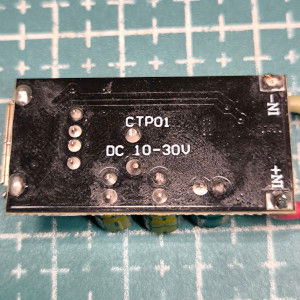
XFW-KC42 step-down module (1A) (Amazon.de) (Amazon.com) (AliExpress)
Product key benefits:
-
The module is available in three versions: single, double, and quadro. The double and quadro versions are multiplications of independent single circuit diagrams with a common power input.
-
The input voltage range is indicated on the module: DC 6V-32V (minimum input voltage determined by testing: 9.7V).
-
Output power up to 24W.
-
This is a buck (step-down) module that can only lower the voltage to the target value.
-
The module has a blue LED indicator that shows when power is connected to the module.
-
The module can be used in car chargers, as a charger connected to a solar panel or batteries (lead-acid, lithium-ion, lithium iron phosphate, etc.).
-
Weight (double): 18.6g
-
Dimensions (double): 40.2×50.4×12mm
3D models suitable for this device:
Supported charging protocols claimed by manufacturer:
-
DCP, APPLE, Samsung, FCP, SCP, AFC, SFCP, QC2/3, MTK PE+1.1/PE+2.0
Supported charging protocols detected by KM003C:
UsbA port:
24V input:
-
AFC 18W (5V2A,9V2A)
-
FCP 18W (5V2A, 9V2A)
-
QC2.0/3.0 (5V, 9V, 12V, 3.6-12V)
-
APPLE 2.4A
-
DCP
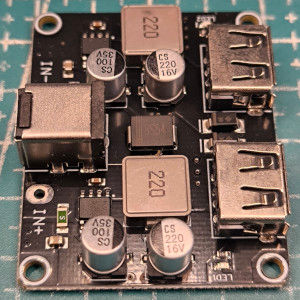

6-24V to 5V 3A USB step-down module (1A) (Amazon.de) (Amazon.com) (AliExpress)
Product key benefits:
-
Voltage range for input specified by the manufacturer: DC 6V-20V (minimum input voltage determined by testing is 5V)
-
Output current up to 3A
-
This is a buck (step-down) module that can only lower the voltage to the target value.
-
The module has a red LED indicator that shows when power is connected to the module.
-
The module can be used in car chargers, as a charger for a connected low-power solar panel or Li-Ion batteries.
-
The module does not support fast charging protocols, which may be convenient for those who consciously prefer a slow charging process to extend the life of the battery of the device being charged.
-
The module is very compact and inexpensive (about $1 on AliExpress).
-
Weight: 3.8g
-
Dimensions: 15.2×27.3×8.9mm
Supported charging protocols claimed by manufacturer:
-
DCP, APPLE 2.4A
Supported charging protocols detected by KM003C:
UsbA port:
5-20V input:
-
APPLE 2.4A
-
DCP


XY-3606T step-down module with Alu shell (4A) (Amazon.de) (Amazon.com) (AliExpress)
Product key benefits:
-
Voltage range for input specified by the manufacturer: DC 9V-36V (testing determined a minimum voltage of 8.2V)
-
This is a buck (step-down) module that can only lower the voltage to the target.
-
The module has a red LED indicator that indicates that power is connected to the module.
-
There are two power options: 5.5x2.1mm jack or D+/D- terminals.
-
Built-in reverse polarity and short circuit protection.
-
The module can be used in car chargers as a charger connected to Li-Ion batteries.
-
The aluminum case is not directly connected to the module with thermal pads and serves primarily as protection against mechanical damage.
-
The module does not support fast charging protocols, which may be convenient for those who consciously prefer a slow charging process to extend the life of the battery of the device being charged.
-
All 4 USB-A ports operate independently of each other, and connecting a subsequent device does not interrupt the power supply.
-
Weight: 46.2g
-
Dimensions: 40.6×72.7×30.7mm
Supported charging protocols claimed by manufacturer:
-
5.2V 5A 25W
Supported charging protocols detected by KM003C:
UsbA port:
5-20V input:
-
SAMSUNG 2A
-
DCP



TPS61088 step-up module (1A) (Amazon.de) (Amazon.com) (AliExpress)
Product key benefits:
-
DC module power supply voltage range: 2.8V-4.5V
-
Maximum input current: 8A
-
Maximum charging power via USB: 24W
-
Good energy conversion efficiency
-
No short-circuit protection
-
This is a boost (step-up) module that can only increase the voltage to the target value.
-
The module is primarily designed for connection to 1S li-ion battery packs, but can also be used with other sources within the input voltage range (2.8-4.5V), such as 3 AA batteries connected in series (1.2V) or 2-3 AA alkaline batteries (1.5V) .
-
I use this module in my Li-ion battery discharge station project.
-
Weight: 7g
-
Dimensions: 16.7×47.5×8.1mm
Supported charging protocols claimed by manufacturer:
-
QC2.0, QC3.0, Huawei FCP, DCP
Supported charging protocols detected by KM003C:
UsbA port:
2.8-4.5V input:
-
AFC 18W (5V2A,9V2A)
-
FCP 18W (5V2A, 9V2A)
-
QC2.0/3.0 (5V, 9V, 12V, 3.6-12V)
-
DCP


Product key benefits:
-
Qi2 is a certified device
-
Compatible with Apple iPhone
-
Built-in permanent magnets (see magnetic field photo).
-
15W wireless charging power
-
1.5 meter cable covered with braided nylon
-
Backwards compatible with older Qi wireless charging standards
Product drawbacks:
-
Magnets could have been stronger
Other product notes:
-
55g weight
-
This charger charged a Samsung S23FE smartphone with about 10W of power (power consumption around 11W)
Supported charging protocols claimed by the manufacturer:
-
PD input: 5V3A/9V2.22A/12V1.67A
Charging protocols detected by KM003C:
USB-C port:
-
PD3.0 27W 9V - as a power source for wireless charging.






Product key benefits:
-
Capacity 10000mah (33Wh)
-
Output - PD3.0, PPS - 25W
-
Input - PD3.0 - 25W (9V/2.77A)!
-
2 USB type-C ports
-
Dimensions(mm): 148x70x15
-
Weight: 210g only!
Product drawbacks:
-
When connecting a second device, there is a brief power reset to the already connected device, and further charging of connected devices occurs via the PD protocol (PPS is disabled).
Other product notes:
-
25W shared between ports or available only from one port.
-
The kit comes with a very good UsbC-UsbC 60W cable with 56mOhm resistance
Supported charging protocols claimed by manufacturer:
-
PD fixed output: 5V/3A, 9V/2.77A
-
PD-PPS output: 3.3-5.9V/3A, 3.3-11V/2.25A
-
PD input: 5V/3A, 9V/2.77A
Supported charging protocols detected by KM003C:
USB-C port:
-
(in/out)PD3.0: 5V/3A, 9V/2.77A
-
(in/out)PD-PPS: 3.3-5.9V/3A, 3.3-11V/2.75A
-
(in/out) DCP(5V1.5A)
-
(in) SAMSUNG 2A
Conclusion:
This power bank is a great companion for your bag or purse, providing a reliable smartphone battery backup while traveling or during heavy daily use. Its lightweight design ensures it won't be a burden, while its quick charging capabilities with 25W power output keep your device powered up efficiently.
It's also a practical solution for smartphones with worn-out batteries that have lost their original capacity.

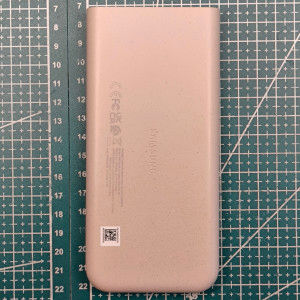

Other USB Power adapters
-
USB-C chargers supporting the PD3.1 protocol with a power output of over 140W:

